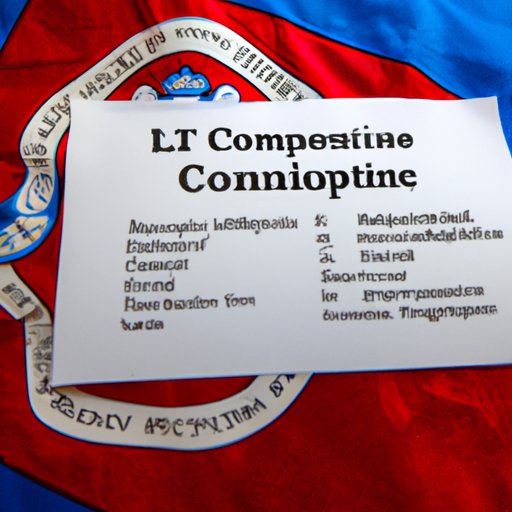Introduction
When starting a business, one of the most important decisions you will make is how to structure it. One popular option is to form a limited liability company (LLC). An LLC is a type of legal entity that combines the features of a corporation and a partnership. It offers the same limited liability protection as a corporation but has a more flexible management structure than a corporation and allows for pass-through taxation like a partnership.
In this article, we will explore the steps to forming an LLC in Connecticut, the benefits of doing so, the requirements, the filing process, the costs associated with forming an LLC in Connecticut, resources for further assistance, and examples of successful LLCs in Connecticut.
Outline the Steps to Forming an LLC in Connecticut
There are several steps to forming an LLC in Connecticut, including choosing a name, filing articles of organization, creating an operating agreement, obtaining necessary licenses and permits, registering with the state tax agency, and opening a bank account.
Choose a Name. The first step in forming an LLC in Connecticut is to choose a name for your business. Your LLC’s name must comply with the state’s naming rules and be distinguishable from any existing LLC names on file with the Secretary of State. Additionally, the name must include the words “Limited Liability Company,” “L.L.C.,” or “LLC.” You can check the availability of your desired name by searching the Connecticut Secretary of State’s database.
File Articles of Organization. After selecting a name, the next step is to file articles of organization with the Connecticut Secretary of State. This document includes information such as the LLC’s name, purpose, address, registered agent, and members. Once the articles of organization are filed, the LLC is officially formed.
Create an Operating Agreement. An operating agreement is a document that outlines the ownership and operating procedures of the LLC. This document may include information such as the rights and responsibilities of each member, the LLC’s management structure, and how profits and losses will be allocated among the members. This document is not required in Connecticut but is strongly recommended.
Obtain Necessary Licenses and Permits. Depending on the type of business you are running, you may need to obtain certain licenses and permits from the state. These may include business licenses, sales tax permits, health department permits, and occupational licenses. Contact your local government office for more information.
Register With the State Tax Agency. After forming your LLC, you must register with the Connecticut Department of Revenue Services. This requires filing Form REG-1, which can be done online or through the mail. Once registered, you will receive a Connecticut Tax Registration Number.
Open a Bank Account. The last step in forming an LLC in Connecticut is to open a business bank account. Having a separate bank account will help you keep track of your business expenses and income. It will also help to protect your personal assets from liability.
Explain the Benefits of Forming an LLC in Connecticut
Forming an LLC in Connecticut can provide several benefits for your business, including:
Limited Liability Protection. One of the main advantages of forming an LLC is the limited liability protection it provides. This means that if your LLC is sued, your personal assets will remain safe from creditors. This is an important benefit for small business owners who want to protect their personal assets.
Flexible Management Structure. Unlike corporations, LLCs do not have to adhere to strict corporate governance rules. This allows LLCs to set up their own management structure that works best for their business. For example, LLCs can choose to be managed by their members or hire a manager to oversee operations.
Pass-Through Taxation. LLCs are also subject to pass-through taxation, meaning that the business’s income is only taxed once at the individual owner level. This can result in significant tax savings compared to other business structures.
Ability to Raise Capital. LLCs also have the ability to raise capital by selling shares of the company. This can be beneficial for businesses looking to expand or acquire additional resources.

Discuss the Requirements for Starting an LLC in Connecticut
Before forming an LLC in Connecticut, there are certain requirements that must be met. These include:
Minimum Number of Members. In Connecticut, LLCs must have at least one member. There is no maximum number of members.
Registered Agent. LLCs must appoint a registered agent in the state of Connecticut. The registered agent must be a resident of the state or a business entity authorized to conduct business in the state. The registered agent is responsible for receiving legal notices on behalf of the LLC.
Publication Requirement. Connecticut also requires LLCs to publish a notice of formation in two newspapers within the county where the LLC’s principal office is located. This requirement must be fulfilled within 120 days of filing the articles of organization.
Describe the Filing Process for Forming an LLC in Connecticut
Once you have met the requirements for forming an LLC in Connecticut, the next step is to file the necessary paperwork with the state. This process involves the following steps:
File Articles of Organization. The first step is to file articles of organization with the Connecticut Secretary of State. This document includes information such as the LLC’s name, purpose, address, registered agent, and members.
Pay Fees. When filing the articles of organization, you must pay the state filing fee. The current fee is $120.
Publish Notice. Connecticut also requires LLCs to publish a notice of formation in two newspapers within the county where the LLC’s principal office is located. This requirement must be fulfilled within 120 days of filing the articles of organization.

Detail the Costs Associated with Forming an LLC in Connecticut
The costs associated with forming an LLC in Connecticut include state filing fees, publication costs, and legal and professional services.
State Filing Fees. When filing the articles of organization, you must pay the state filing fee. The current fee is $120.
Publication Costs. Connecticut also requires LLCs to publish a notice of formation in two newspapers within the county where the LLC’s principal office is located. This requirement must be fulfilled within 120 days of filing the articles of organization. The cost of this publication varies depending on the newspaper.
Legal and Professional Services. You may also incur costs for legal and professional services. This can include the cost of preparing and filing the articles of organization, obtaining necessary licenses and permits, setting up a corporate bank account, and drafting an operating agreement. The cost of these services will vary depending on the provider.

Provide Resources for Further Assistance in Forming an LLC in Connecticut
If you need further assistance in forming an LLC in Connecticut, there are several resources available. These include:
Secretary of State Website. The Connecticut Secretary of State website provides information about the requirements for forming an LLC in the state, as well as forms and instructions for filing articles of organization.
Small Business Administration. The Small Business Administration (SBA) provides a wealth of information and resources to help small business owners understand the process of forming an LLC. They also offer free counseling and training programs.
Local Small Business Development Centers. Many states, including Connecticut, have Small Business Development Centers (SBDCs) that provide free business counseling and resources to entrepreneurs. They can answer questions about forming an LLC and provide guidance on the steps involved.

Showcase Examples of Successful LLCs in Connecticut
Connecticut is home to many successful LLCs, including:
Example 1. The Business Development Group LLC is a consulting firm based in New Haven, Connecticut that specializes in helping small businesses grow and succeed. Since its founding in 2009, The Business Development Group LLC has helped numerous businesses in the state achieve their goals.
Example 2. The Connecticut Kitchen Company is a family-owned LLC based in Hartford, Connecticut that specializes in custom kitchen design and remodeling. The company was founded in 2002 and has been providing high-quality kitchen designs to homeowners in the state ever since.
Example 3. The Digital Design Group LLC is a web design and digital marketing agency based in Stamford, Connecticut. The company was founded in 2014 and has since grown to become one of the leading digital agencies in the state.
Conclusion
Forming an LLC in Connecticut can provide your business with several advantages, including limited liability protection, flexible management structure, and pass-through taxation. To form an LLC in Connecticut, you must choose a name, file articles of organization, create an operating agreement, obtain necessary licenses and permits, register with the state tax agency, and open a bank account. You must also meet certain requirements, such as appointing a registered agent and publishing a notice of formation. Additionally, there are costs associated with forming an LLC in Connecticut, including state filing fees, publication costs, and legal and professional services. There are also several resources available for further assistance in forming an LLC, such as the Secretary of State website, the Small Business Administration, and local Small Business Development Centers. Finally, there are many successful LLCs in Connecticut, such as The Business Development Group LLC, The Connecticut Kitchen Company, and The Digital Design Group LLC.
Forming an LLC in Connecticut can be a complex process, but with the right information and resources, you can ensure that your business is properly set up and receives the benefits that come with forming an LLC.
(Note: Is this article not meeting your expectations? Do you have knowledge or insights to share? Unlock new opportunities and expand your reach by joining our authors team. Click Registration to join us and share your expertise with our readers.)
